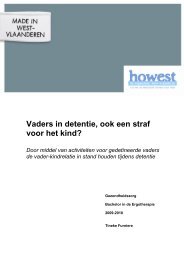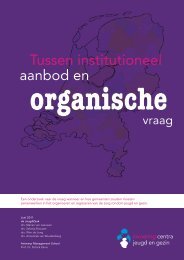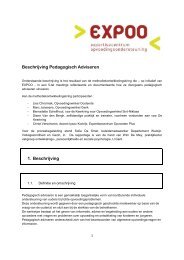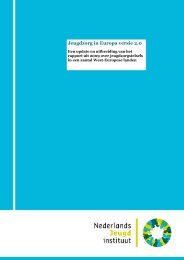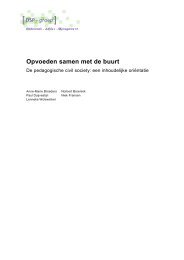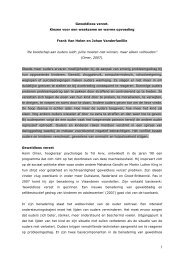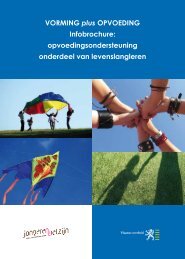7. Principle 4. Sustainability: Creating long-lastingownership and commitment7.1. Why sustainability is importantIn the previous two chapters we tried to demonstrate how co-production methods andclose attention to the development of social capital can enhance programme effectivenessand contribute to the sustainability of local positive parenting practice. This creates thekind of social context referred to in recent legislation that requires commissioners to takeaccount of the social value that such programmes can deliver through carefully consideredlocal implementation plans. We believe socially inclusive practice has ‘outcome value’ aswell as the more traditional view of its ‘process value’.We now focus on how parenting programmes themselves can be sustained by theirintegration into ‘services as usual’. This is important for social inclusion because it increasesthe likelihood that families who could benefit will be able to gain access both now and inthe future rather than another good idea turning into just another ‘flash in the pan’.Many people are seeking new ways to improve children’s lives – to reduce violence, toprevent maltreatment, to improve school performance, and so on. Parenting programmesare amongst the interventions shown by the highest standard of evidence to enhancechildren’s health and development. In the UK the top five includes the most well-known,Incredible Years and Triple P and three others, as ranked by the National Academy ofParenting Practitioners for the Parenting Early Intervention Pathfinders (PEIPS) initiative;Family Strengthening Programme/Family Strengthening (10-14), Family Community, andFAST. These five appear on a recommended list of evidence-based parenting programmesfor local authorities to choose from when commissioning local services. Local educationauthorities have received state funding for training local parenting practitioners in one ofthese five approaches.This is exciting and welcome but there are also some salutary lessons to be learned fromexisting attempts to scale-up the implementation of such programmes.Only a few sites in the world are near delivering parenting programmes sustainably. Thismight be described as integrating an innovation into ongoing operations, orinstitutionalising the programme or, more simply, getting a model programme embeddedin ‘services as usual’. Put another way, although parenting programmes are often designedto be delivered through youth justice, social services, education or mental health systems, itis rare that they have succeeded in becoming a core part of such systems, despite the factthat, as we have demonstrated in the previous section, some deliver benefits far beyondtheir obvious purpose and cost.In the US some state-wide scaling-up initiatives have taken place to implement parentingprogrammes. For example in Florida, the work of Evidence-based Associates has led toMulti-systemic Therapy (MST) and Functional Family Therapy (FFT) becoming ‘services asusual’ state-wide. Washington State is institutionalising MST, FFT, and AggressionReplacement Training as part of the juvenile justice system, again state-wide. IncredibleYears has been developing throughout Wales over many years and they have recently56 Professional Practice Board
published a successful RCT in Norway where their programme is now being rolled outacross the country. FAST is currently being taken to scale in the UK in a partnership withSave the Children. These examples are being evaluated as they develop but longer termresults are so far very limited. Another example illustrates the longer term issue:FASTWisconsin (Anti-Drugs, 1990-2000) and California (Juvenile Delinquency Prevention 1994-2004)each sustained FAST for over $1million a year for over ten years across school districts and counties.South Carolina supported FAST state-wide into every elementary school for four years with a $6million a year initiative in children’s mental health prevention services, although that initiativeended when a new Governor was elected. In a follow-up study of the State of Wisconsin FASTinitiative, it was determined that following the three year state grants to a school district, there was aone third, one third, one third split around the outcome: one third of the districts continued toimplement FAST with all its core components intact using local tax dollars; one third altered corecomponents by dropping the parent partners, the cultural representation, the monthly booster sessionsfor two years, the collaborative multi-agency partnership and making it just a school programme,dropped the family meal, the singing, the eight weekly sessions to just three, and introduced lecturesto the parents rather than letting them find their own agendas. The last third dropped local fundingaltogether.In those Districts where changes were made these were not locally agreed culturaladaptations but examples of ‘model drift’. The majority of Districts that had earlierinvested enthusiastically in training, supervision and programme evaluation failed to reapthe long-term benefits of their investment. Failure to sustain programmes in this way limitsthe benefits only to the original participants and even then these benefits are likely to beshorter-term than where a programme is sustained as part of local community life.Curtailment also wastes money, good will and expertise. ‘Few preventive interventions“inoculate” the target population against (long-term) poor outcomes’ (Bumbarger &Perkins, 2008, p.60). In the start-up phase the budget incurs large one-off costs (training,materials, etc.) and the programme will not yet be operating optimally. In addition,stopping a programme can erode trust and goodwill in communities and can underminefuture efforts to implement other evidence-based programmes. Finally, it means that fewchildren and families experience an evidence-based programme, and for those that do thisis often only in the context of an RCT after which services return to normal. Tens ofthousands of children who might otherwise benefit are not being reached. The marketpenetration of Multi-Systemic Therapy, for example, is about one per cent (Little, 2010).In Wisconsin, after 10 years of continuing support, FAST was only available in 25 per centof the state’s 425 school districts.7.2. Why sustainability is hard to achieveBefore setting out some potential solutions, it helps to understand why the problem ofsustainability arises. Earlier we pointed out the many problems researchers face insuccessfully replicating model programmes in locations away from their place ofdevelopment or the original research site. The outcomes of many such replications turnout to deliver much less than their original research prowess would have promised(Bachrach, 1987; Mihalic et al., 2002). In practice the reasons for this are many and<strong>Technique</strong> <strong>Is</strong> <strong>Not</strong> <strong>Enough</strong> 57
- Page 1 and 2:
Professional Practice BoardTechniqu
- Page 3:
ContentsAcknowledgements ..........
- Page 6 and 7:
We also wish to thank Sarah Fitzroy
- Page 8 and 9: alienation and sense of isolation f
- Page 10 and 11: A range of these programmes are rec
- Page 12 and 13: 2. Vision and purpose2.1. The brief
- Page 14 and 15: From this conference a commitment t
- Page 16 and 17: development strategies have been us
- Page 18 and 19: 3. The socio-political context3.1.
- Page 20 and 21: Box 1: UNODC compilation of evidenc
- Page 22 and 23: cost-effective and it has caused so
- Page 24 and 25: Positive ActionPositive Action was
- Page 26 and 27: ■Programmes must have robust evid
- Page 28 and 29: These principles are based on our a
- Page 30 and 31: families who might benefit. This pr
- Page 32 and 33: providers and partner agencies were
- Page 34 and 35: Positive Parenting Programme (Tripl
- Page 36 and 37: multiple approaches that also inclu
- Page 38 and 39: need to learn English in their pare
- Page 40 and 41: Parenting programmes that work in m
- Page 42 and 43: 5. Principle 2. Cultural sensitivit
- Page 44 and 45: Positive ActionPositive Action faci
- Page 46 and 47: attitudes. Such attitudes can surfa
- Page 48 and 49: developed purely from a theory-driv
- Page 50 and 51: cultural heritages lecture at them.
- Page 52 and 53: having reciprocal relationships to
- Page 54 and 55: first started delivering the progra
- Page 56 and 57: Strengthening Families ProgramWhen
- Page 60 and 61: operate at different levels. Some a
- Page 62 and 63: Incredible YearsAnother component o
- Page 64 and 65: commissioners can have more confide
- Page 66 and 67: Incentives for achieving model fide
- Page 68 and 69: 8. A framework for ensuring that ev
- Page 70 and 71: 9. Next stepsEvidence-based parenti
- Page 72 and 73: 70 Professional Practice Board
- Page 74 and 75: 72 Professional Practice Board
- Page 76 and 77: ReferencesAlinsky, S.D. (1971). Rul
- Page 78 and 79: Davidson, G. & Campbell, J. (2007).
- Page 80 and 81: Heindrichs, N., Bertram, H., Kusche
- Page 82 and 83: McDonald, L., FitzRoy, S., Fuchs, I
- Page 84 and 85: Spoth, R., Redmond, C., Hockaday, C
- Page 86: The British Psychological SocietySt




